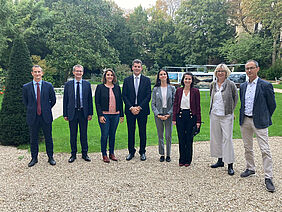(Paris, 6 October 2023) On 4 October 2023, some 50 representatives of the organic farming sector, trade, politics, diplomacy and research gathered at the Swiss Embassy in Paris. The event was organised in cooperation with FiBL Switzerland and FiBL France. It provided an opportunity to exchange views on the challenges involved in developing an organic value chain capable of meeting the requirements of sustainability and biodiversity conservation. The opening address was given by the Swiss Ambassador to France, Roberto Balzaretti. This was followed by a discussion moderated by journalist Blandine Laffargue. The participants included: Serge Lhermitte, Deputy Director General for Corporate Economic and Environmental Performance at the French Ministry of Agriculture and Food Sovereignty; Jean-Marc Chappuis, Deputy Director of the Swiss Federal Office for Agriculture; Florence Arsonneau, Director of FiBL France; Swanny Lorfanfant, Head of Organic Market and Value Chain at Carrefour Group; and Rolf Bernhard, Head of Agronomy and Production Systems at the Federation of Migros Cooperatives and member of the Foundation Council of FiBL Switzerland. Production at affordable prices, the financing of research in close cooperation with farmers, and the involvement of all private and public stakeholders in research and innovation were just some of the topics addressed by the speakers. FiBL Switzerland was represented by Beate Huber, member of its Board of Directors.
Despite the strained economic situation, organics remains a priority in France and Switzerland
"Organics has a future − we must support organic agriculture! With this in mind, the Ministry recently announced an increase in the 'Fonds Avenir Bio' as well as additional funds for communication," explains Serge Lhermitte from the French Ministry of Agriculture and Food Sovereignty. Jean-Marc Chappuis from the Swiss Federal Office for Agriculture (FOAG) concurs: "Growth in the organic market in Switzerland has slowed down, but organic agriculture has long been firmly rooted with consumers. And we use a range of instruments to support production and research." Florence Arsonneau, the Director of FiBL France, also reminds us that "one of the challenges for the future of organic agriculture is to make it accessible to all." She adds: "That is why FiBL is concerned with the entire agri-food system as well as the organic sector’s societal contributions."
Shaping the future of organic farming through research and innovation
Over the past 50 years, FiBL has developed world-renowned expertise in applied on-farm research focused fully on organic agriculture. Endorsed by organic farmers, FiBL France was established in 2017 in the department Drôme in south-eastern France. Its establishment made it possible to strengthen Franco-Swiss relations and, in particular, to work on climate change adaptation in organic farming. "In my opinion, to be inspired by farmers' knowledge and to create something new together with them is the heart of innovation. It is crucial to do the research with and among farmers," Florence Arsonneau emphasises. "However, on-farm research is currently not as widespread in France as it is in Switzerland," she notes. FiBL France collaborates with French organic farming research and development institutions such as the ITAB (Technical Institute for Organic Food and Farming) and the FNAB network (National Federation of Organic Agriculture). The aim of these collaborations is to carry out multidisciplinary and applied research projects aimed at providing practical solutions for farmers.
Retailers can support research and innovation in the organic sector
Innovation can also be found in the forms of cooperation with various actors along the food value chain who support the research work, such as some retailers. According to Rolf Bernhard, executive at retailer Migros and member of the Foundation Council of FiBL Switzerland, the more than 15 years of collaboration with FiBL allows Migros to be very close to organic farmers. "To understand their production methods and support them in making their practices sustainable, especially in the face of climate change, is not only a means of ensuring yields and product availability all year round, but also enables us to make our pricing policy as fair as possible," he stresses. In this context, Swanny Lorfanfant from the Carrefour Group explains: "We support 3500 French organic producers through trilateral three-year contracts. But we have also chosen to financially support emerging sectors such as French organic raspberry and blueberry production through our foundation."
The organic label suffers competition from the proliferation of other eco-labels
In France today, some farmers are adopting certain organic practices without fully converting to organics in order to keep open certain technical options. So practices spread to a greater degree than the national organic label "Agriculture Biologique (AB)." Moreover, there is competition from other labels developed by the state, such as the "Haute Valeur Environnementale" label (less strict and with different requirements than the AB label) or private labels such as the "sans résidu de pesticides" indication ("without pesticide residues"; does not include checks on production methods). In Switzerland, no proliferation of labels competing with the organic label is evident. Internationally, other terms that indicate "greening" are also coming to the fore. An example would be agroecology, which in practice is compatible with organic agriculture, but can also contribute to confusing consumers. Florence Arsonneau concludes: "The priority is to make visible the entirety of the services provided by organic agriculture − which is what FiBL is working on: Conservation and promotion of biodiversity, climate resilience, societal contributions such as human health and sustainability of food systems. Even today, organic is too often equated only with non-use of pesticides. We need to highlight its multifunctionality."
Further information
FiBL contacts
- Florence Arsonneau, Director of FiBL France
- Franziska Hämmerli, Media spokesperson of FiBL Switzerland




